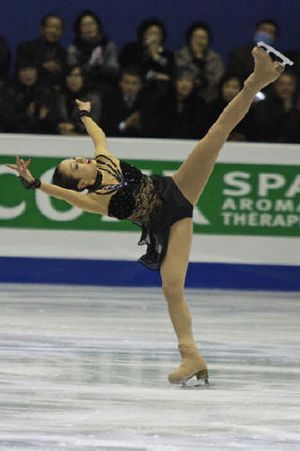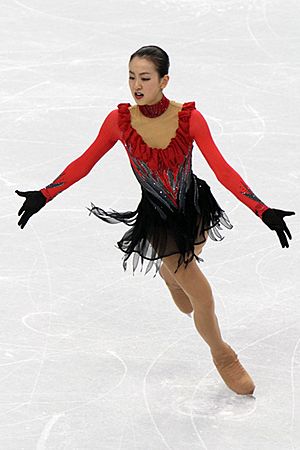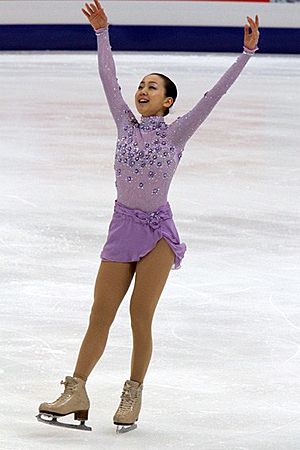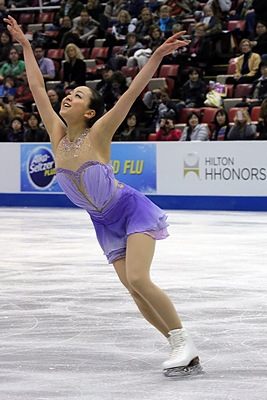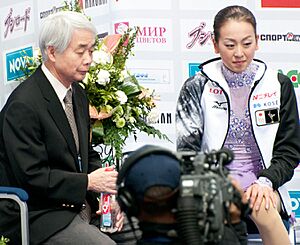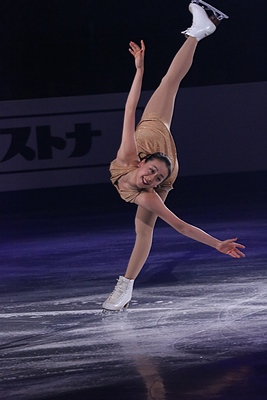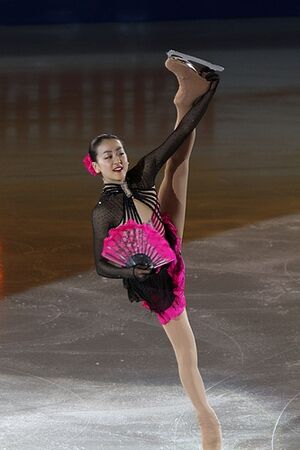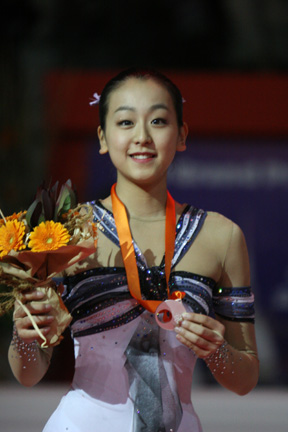Mao Asada facts for kids
Quick facts for kids Mao Asada |
|
|---|---|
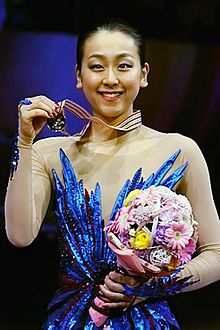
Mao Asada at the 2014 World Championships.
|
|
| Personal information | |
| Native name | 浅田 真央 |
| Country represented | |
| Born | 25 September 1990 Meitō-ku, Nagoya, Aichi, Japan |
| Height | 1.63 m (5 ft 4 in) |
| Skating club | Chukyo University |
| Began skating | 1995 |
Mao Asada (浅田 真央, Asada Mao, born 25 September 1990) is a famous Japanese former figure skater. She won a silver medal at the 2010 Winter Olympics. Mao is also a three-time World champion (2008, 2010, 2014). She won the Four Continents championship three times (2008, 2010, 2013). She also won the Grand Prix Final four times.
Mao Asada made history at the 2010 Winter Olympics. She was the first female figure skater to land three triple Axel jumps in one competition. She also won the 2005 World Junior championship. She was the 2004–05 Junior Grand Prix Final champion. Mao also won the Japanese national championship six times.
She once held the world record for the ladies' short program score. She set this record at the 2014 World Championships. Mao was a very talented young skater. She was the fifth woman and the first junior girl to land a triple Axel. She achieved this at the 2004–05 Junior Grand Prix Final.
Mao won her first Grand Prix Final when she was just 15 years old. Many people thought she was the best figure skater in the world at that time. She was too young to compete at the 2006 Winter Olympics. Mao is the first singles skater from Asia to win multiple world championships. At the 2013 Skate America, she became the first singles skater to win all seven current events in the Grand Prix series. She has 15 Grand Prix series titles. This is the second-highest total for ladies.
Mao Asada won many ISU titles. This made her one of the most famous athletes in Japan. Many people consider her one of the best ladies figure skaters ever. She is known for combining amazing athleticism with beautiful artistry. Famous skaters like Yuzuru Hanyu and Shoma Uno look up to Mao Asada as their role model.
Contents
- About Mao Asada's Life
- Mao Asada's Skating Journey
- Starting Out in Skating
- Junior Success: 2004–05 Season
- Moving Up: 2005–06 Season
- Training in the U.S.: 2006–07 Season
- New Coaches and World Title: 2007–08 Season
- Making History: 2008–09 Season
- Olympic Silver and Second World Title: 2009–10 Season
- Reworking Jumps: 2010–11 and 2011–12 Seasons
- Return to Form: 2012–13 Season
- Third World Title and Olympic Challenge: 2013–14 Season
- Comeback and Retirement: 2015–16 and 2016–17 Seasons
- Skating Skills and Style
- Amazing Records and Achievements
- Mao Asada in Public Life
- Mao Asada Thanks Tour
- Skating Programs
- Competitive Highlights
- Images for kids
- See also
About Mao Asada's Life
Mao Asada was born on September 25, 1990. Her birthplace was Meitō-ku, Nagoya, Aichi, Japan. She was named after a Japanese actress, Mao Daichi. She went to Nagoya International School for a while. Later, she graduated from Takabari Elementary School and Takabaridai Junior High. She finished high school in March 2009. After that, she went to Chukyo University and graduated in March 2015. When she was growing up, she admired Midori Ito, another famous skater. Mao practiced skating almost every day after school.
Her older sister, Mai Asada, is also a figure skater. Mai won two gold medals in the ISU Junior Grand Prix series. She also placed 6th at the 2006 Four Continents Championships. Today, Mai works as a TV presenter and performs in ice shows.
Mao Asada had a miniature poodle named Aero. Aero was named after the chocolate candy made by Nestlé. Mao even included Aero in some of her exhibition skating programs. She also had two other dogs named Tiara and Komachi.
On November 11, 2024, Mao Asada opened her own figure skating rink. It is called "MAO RINK" and is located in Tachikawa, Tokyo. At the opening, she said she believes it is "the best rink in the world." Her goal is to help train future world champion skaters.
Mao Asada's Skating Journey
Starting Out in Skating
Mao Asada first studied classical ballet from age three to nine. But she decided to follow her sister and switch to figure skating.
She won the Japanese novice national championships in the 2002–03 season. This win allowed her to compete at the junior championships, where she finished 4th. She also competed in the senior national championships and placed 7th.
In the 2003–04 season, Mao had similar results at the novice and junior levels. She placed 8th at the senior nationals. She won her first international event, the Mladost Trophy.
Junior Success: 2004–05 Season
In the 2004–05 season, Mao was old enough for junior international events. She competed in the ISU Junior Grand Prix series and won both of her events. At the Junior Grand Prix Final, she won the gold medal. She was far ahead of the silver medalist, Yuna Kim. Mao became the first junior ladies skater to land a triple Axel in a competition. She was also the fifth woman overall to do so. Mao won the Japanese Junior National championships. This qualified her for the 2005 Junior Worlds.
Her win also earned her a spot at the senior national championships, where she won the silver medal. Mao was not old enough for the 2005 World Championships. At the Junior World Championships, she won by a large margin over Kim Yuna. She also set new junior-level ladies' records for total score and free skating score. These records lasted until 2011.
Moving Up: 2005–06 Season
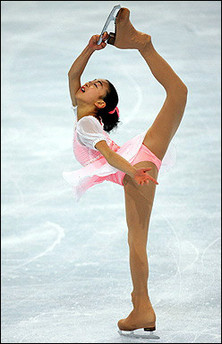
After winning everything at the junior level, Mao moved to the senior level in the 2005–06 season. She competed in the Senior Grand Prix circuit. During this time, Mao beat future medalists from the 2006 Torino Winter Olympics. These included gold medalist Shizuka Arakawa and silver medalist Sasha Cohen. At the 2005 Cup of China, she won the silver medal. Mao won her second event, the 2005 Trophée Eric Bompard. Her wins qualified her for the 2005–06 Grand Prix Final. At her first Senior Grand Prix Final, Mao won the event at just 15 years old.
At the 2005–06 Japan Championships, Mao won the silver medal. She was too young to compete in the Olympics that year. At the 2006 World Junior Championships, Mao finished second. In this competition, she became the first lady to land a triple Axel in the short program at an ISU championship.
Training in the U.S.: 2006–07 Season
Mao moved to the United States in August 2006 to train with Rafael Arutyunyan. This helped her avoid crowded Japanese rinks and media pressure.
At her first event, the 2006 Skate America, Mao won the bronze medal. She won her second event, the 2006 NHK Trophy, setting a new world record for the highest combined score in a Ladies' competition. Mao went into the 2006–07 Grand Prix Final as the defending champion. She placed second.
Mao won the 2006–07 Japan Championships. At the 2007 Worlds Championships, Mao won the free skating with a new world record score. She won the silver medal at her first Senior World Championships.
New Coaches and World Title: 2007–08 Season
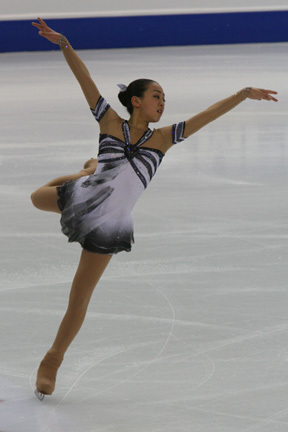
In summer 2007, Mao trained with Tatiana Tarasova in Russia. Arutyunyan was still her main coach. At the 2007 Skate Canada International, Mao won gold. She also won gold at the 2007 Trophée Eric Bompard.
Mao went to the 2007–08 Grand Prix Final in Turin, Italy. She won the silver medal. As in the previous year, Mao won the 2007–08 Japan Championships. Before the Four Continents, she stopped working with Arutyunyan. She returned to Japan to practice at Chukyo University.
Mao competed at both ISU Championships without a coach. She won the Four Continents Championships for the first time. In March 2008, at the Worlds Championships, Mao won her first World title.
Making History: 2008–09 Season
In summer 2008, Mao began to be formally coached by Tarasova.
At the 2008 Trophée Eric Bompard, Mao finished second. She won gold at the 2008 NHK Trophy. She qualified for the 2008–09 Grand Prix Final. Mao won the Grand Prix Final, beating her rival Yuna Kim. She made history in the free skate. She became the first woman to land two triple Axels in the same program in an ISU competition.
At the 2008–09 Japan Championship, Mao won her third national title. At the 2009 Four Continents Championships, Mao placed third overall.
At the 2009 World Championships, Mao finished in fourth place. At the first 2009 World Team Trophy, she won both the short and free programs. The Japanese team finished third overall.
Olympic Silver and Second World Title: 2009–10 Season
Mao won the silver medal at 2009 Trophée Eric Bompard. At the 2009 Rostelecom Cup, she finished 5th.
At the 2009–10 Japan Championships, Mao won her fourth Japanese national title.
At the 2010 Four Continents Championships, Mao won the gold medal. Due to Tarasova's health, Mao was coached mostly by her assistant. After the 2010 Olympics, Mao decided to train in her hometown, Nagoya, and parted ways with Tarasova.
From February 23 to 25, Mao competed at the 2010 Winter Olympics. She placed second in the short program. In her free skate, she landed two triple Axels. Mao won the Olympic silver medal. She earned a Guinness World Record for the most triple Axels performed by a female skater in a competition. Mao was Japan's flag-bearer at the closing ceremonies.
At the 2010 World Championships, Mao won her second world title. She became the first singles figure skater from Asia to win multiple world championship titles.
Reworking Jumps: 2010–11 and 2011–12 Seasons
In September 2010, Nobuo Sato became Mao's new coach. After the Vancouver Olympics, Mao decided to relearn all of her jumps. This was to improve her technique. This process caused her to have a difficult time in the 2010–11 and 2011–12 seasons. She did not skip any competitions during this time.
At the 2010 NHK Trophy, Mao placed 8th. At the 2010 Trophée Eric Bompard, she finished 5th.
At the 2010–11 Japan national championships, Mao placed second. At the 2011 Four Continents Championships, Mao won the silver medal. At the 2011 World Championships, Mao finished 6th.
Mao started the 2011–12 season at the 2011 NHK Trophy, winning silver. At the 2011 Cup of Russia, Mao won gold and qualified for the 2011–12 Grand Prix Final. She had to withdraw from the Final because her mother became seriously ill and passed away.
Mao secured her fifth national title at the 2011–12 Japan Championships. She won the silver medal at the 2012 Four Continents Championships. At the 2012 World Championships, Mao finished sixth.
After a tough season and her mother's death, Mao thought about quitting. But after visiting her choreographer, she realized she still loved skating and decided to continue.
Return to Form: 2012–13 Season
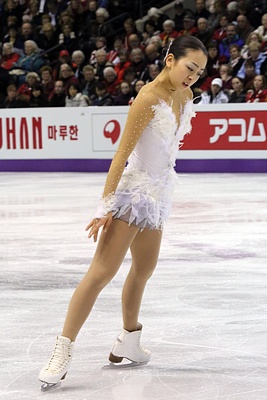
Mao started the 2012–13 season at the Japan Open, winning gold. She won gold at her two Grand Prix events, the 2012 Cup of China and the 2012 NHK Trophy. This qualified her for the 2012–13 Grand Prix Final. Mao won her third Grand Prix Final title in Sochi, Russia. Mao won her sixth national title at the 2012–13 Japan Championships.
At the 2013 Four Continents Championships, Mao won the gold medal. This was the second time Japan had won all three medals at this event.
Mao returned to the World podium with a bronze medal at the 2013 World Championships. Mao placed fifth at the World Team Trophy, and team Japan placed third.
Third World Title and Olympic Challenge: 2013–14 Season
Mao started the 2013–14 season at the Japan Open. She won gold at her two Grand Prix events, the 2013 Skate America and the 2013 NHK Trophy. She became the first singles skater to win all seven current events in the Grand Prix series. She won her fourth Grand Prix Final title. Mao became the first woman to complete two Grand Prix seasons without losing. In December, Mao competed in the 2013–14 Japan Championships, finishing 3rd overall.
In the team event at the 2014 Winter Olympic Games, Mao skated the ladies' short program. She placed third individually. Team Japan finished fifth. In the ladies' singles event, she placed 16th in the short program. Many people supported her for the free skate. She performed very well in the free skating, landing 8 triple jumps. This placed her third in the free skating and sixth overall. Mao's free skating was very difficult technically. Many considered it the best performance of the ladies' competition.
At the 2014 World Championships, she broke the world record for the short program. Mao won her third world title. With this win, she became the third woman in 45 years to win three world championship titles.
After winning the World Championship, Mao said she might continue her career. On May 19, 2014, Mao announced she would take a break from skating for the next season. She said she was tired and wanted to focus on other parts of her life, like university.
Comeback and Retirement: 2015–16 and 2016–17 Seasons
On May 18, 2015, Mao announced she would return to competitive skating. She started training again with coach Nobuo Sato. Her first competition back was the 2015 Japan Open. She landed her first triple Axel in over a year. Her first-place skate helped Team Japan win first place.
For the 2015–16 Grand Prix series, Mao competed at 2015 Cup of China and 2015 NHK Trophy. At the Cup of China, she won her first international competition since returning. This win extended her Grand Prix winning streak to eight, the longest for any woman. She won bronze at the 2015 NHK Trophy. Mao's results qualified her for the 2015–16 Grand Prix Final, where she finished sixth.
Mao won bronze at the 2015–16 Japan Championships. She chose to skip the Four Continents Championships to focus on the World Championships. In April 2016, she finished seventh at her final World Championships event.
Mao began her 2016–17 season with a silver medal at the 2016 CS Finlandia Trophy. At 2016 Skate America, she placed 6th. Her second event was the 2016 Trophee de France, where she placed 9th overall.
On April 10, 2017, Mao Asada announced on her blog that she had retired from competitive skating.
Skating Skills and Style
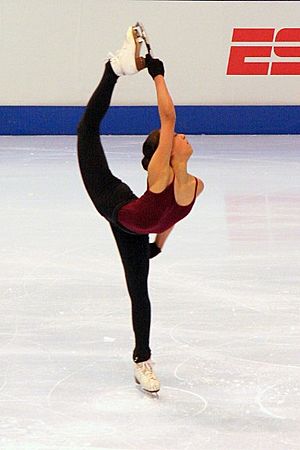
Mao Asada was known for her amazing flexibility in spins and spirals. Early in her career, she was famous for her special move, the cross-grab Biellmann position. She also performed the one-handed Biellmann spin. Mao was also known for her complex footwork sequences.
Mao landed her first triple Axel when she was 12 years old. She became the first lady to perform a triple-triple-triple combination in a national competition. At 14, Mao landed a triple Axel in her free skating at the 2004–05 Junior Grand Prix Final. This made her the first junior girl to do so in an international event. She became well-known for her triple Axel jumps.
After the 2010 Winter Olympics, Mao decided to change her jumps. She wanted a smoother jump technique. This involved adding speed to her approach and increasing the height of her jumps. She also fixed a habit of moving her shoulders before jumping. This process took two seasons. By the 2013–14 season, Mao said that "every single one of my skating techniques had been changed." At the 2014 Winter Olympics Ladies Free Skating event, Mao successfully performed all six triple jumps.
Mao Asada also practiced quadruple jumps in training. She improved her spins by training with Takahiko Kozuka. The number of rotations she could do with one kick increased greatly.
Amazing Records and Achievements
Mao Asada holds many impressive records in figure skating:
- She was the world record holder for the ladies' short program score (78.66). She set this at the 2014 World Championships in March 2014. This record was broken in 2016.
- She was the second woman to score over 200 points for the total score under the ISU Judging System.
- She was the third woman to score over 140 points for the free skate score under the ISU Judging System.
- She was a former world record holder for the ladies' free skating score (133.13). She set this at the 2007 World Championships in March 2007.
- She was a former world record holder for the ladies' combined total score (199.52). She set this at the 2006 NHK Trophy in December 2006.
- She was a former world record holder for the junior ladies' free skating score (119.13). She set this at the 2005 World Junior Championships in March 2005.
- She was a former world record holder for the junior ladies' combined total score (179.24). She set this at the 2005 World Junior Championships in March 2005.
Triple Axel Records
- She is the oldest woman (26 years old) to land a triple Axel in international competition.
- She was the fifth woman to land the triple Axel jump in international competition (2004-2005 Junior Grand Prix).
- She was the first junior girl to land the triple Axel jump in international competition (2004-2005 Junior Grand Prix).
- She was the first woman to land the triple Axel jump at the World Junior Championships.
- She was the first woman to land three triple Axel jumps in one competition (Figure skating at the 2010 Winter Olympics – Ladies' singles).
- She was the first woman to land a triple Axel in the short program at the Winter Olympics.
- She was the first woman to land the triple Axel in multiple Olympics.
- She was the second woman to land a triple Axel at the Winter Olympics.
- She was the first woman to land two triple Axel jumps in the same program (2008-2009 Grand Prix Final).
- She currently holds the record for most triple Axels landed in international competition by a woman.
Other Achievements
- She was the first figure skater in a singles discipline from Asia to win multiple world championships.
- She was the first Japanese figure skater in any discipline to win multiple world championships.
- She was the first singles figure skater to win all seven current events on the Grand Prix circuit.
- She was the first woman to complete two consecutive Grand Prix seasons without losing.
- She is the first and only female figure skater to achieve triple Career Grand Slams.
- She was the first non-European woman to receive the Career Grand Slam.
- She was the first non-European woman to receive two Career Grand Slams.
- She was the youngest non-European woman to receive the Career Grand Slam, at age 17.
- She was the oldest non-European woman to receive the Career Grand Slam, at age 23.
- She holds 15 Grand Prix series titles – the third-most titles in history.
- She holds 8 consecutive Grand Prix circuit victories – the longest streak of any woman in history.
- She is tied for the most Grand Prix Final titles won by a woman.
- She is tied for the most Four Continents Championships titles won by a woman.
- She is the only woman to have landed five Axel jumps in the same Olympic competition.
Mao Asada's World Record Scores
| Combined Total Records | |||
|---|---|---|---|
| Date | Score | Event | Note |
| 2 December 2006 | 199.52 | 2006 NHK Trophy | This record was broken by Yuna Kim in March 2009. |
| Short Program Records | |||
| Date | Score | Event | Note |
| 27 March 2014 | 78.66 | 2014 World Championships | This record was broken by Evgenia Medvedeva in December 2016. |
| Free Skating Records | |||
| Date | Score | Event | Note |
| 24 March 2007 | 133.13 | 2007 World Championships | This record was broken by Yuna Kim in November 2007. |
| Junior Ladies' Combined Total Records | |||
| Date | Score | Event | Note |
| 6 March 2005 | 179.24 | 2005 World Junior Championships | This record was broken by Yulia Lipnitskaya in October 2011. |
| 5 December 2004 | 172.83 | 2004–05 Junior Grand Prix Final | |
| Junior Ladies' Short Program Records | |||
| Date | Score | Event | Note |
| 5 March 2005 | 60.11 | 2005 World Junior Championships | This record was broken by Yuna Kim in March 2006. |
| 4 December 2004 | 57.91 | 2004–05 Junior Grand Prix Final | |
| 30 September 2004 | 56.24 | 2004–05 ISU Junior Grand Prix, Ukraine | |
| Junior Ladies' Free Skating Records | |||
| Date | Score | Event | Note |
| 6 March 2005 | 119.13 | 2005 World Junior Championships | This record was broken by Yulia Lipnitskaya in October 2011. |
| 5 December 2004 | 114.92 | 2004–05 Junior Grand Prix Final | |
Mao Asada in Public Life
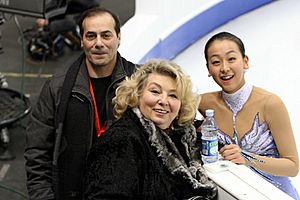
Mao Asada is very popular in Japan. She helped make figure skating more popular there. Since she was a junior skater, she has been a household name in Japan. People affectionately call her "Mao-chan." During the 2014 Winter Olympics, Mao was the most talked-about athlete on Twitter.
Mao Asada has her own ice show called "The Ice." It started in summer 2008 with her sister Mai Asada. Her skating music was put on two albums. The Asada sisters have also been goodwill ambassadors for Canada.
In 2011, Mao launched her own kimono brand called MaoMao. In January 2012, she decided not to release a book about her skating career. She said the advertising for the book was not what she had in mind.
Mao has appeared on many TV shows and in commercials. She and her dog Aero were in chocolate commercials in Japan. She has been sponsored by many big companies. These include Coca-Cola, Nestlé, and Olympus Corporation. Her current sponsors include Airweave, Japan Airlines, and Sumitomo Life. In December 2013, Japan Airlines even put a special picture of Mao Asada on one of their airplanes. This was to promote Japan's participation in the 2014 Winter Olympics.
During the 2010 Winter Olympics, a food vendor in Vancouver named a hot dog after Mao. A local sushi store also created a sushi roll named the Mao Roll. After she won her silver medal, a Japanese dollmaker created a Mao Asada hina doll. In December 2013, flower farmers named a new type of flower "Mao Orange" after the color of her skating dress.
In April 2014, an exhibition about Mao Asada called "Smile" opened in Tokyo. It attracted over 10,000 visitors on its first day. In just nine days, it reached over 100,000 visitors, a record for the store. The exhibition showed 30 of Mao's skating costumes and her medals, including her Olympic silver medal.
In July 2014, Mao debuted as a reporter for a travel TV show. She traveled to Austria, Slovakia, and Hungary to learn about the history of figure skating. In March 2015, Mao became a DJ host for her weekly radio show, "Mao Asada's Nippon Smile."
She is a big fan of Japanese pop star Ayumi Hamasaki. French Olympic Medalist figure skater Philippe Candeloro is a huge fan of Mao Asada and calls himself her godfather.
Mao Asada Thanks Tour
The "Mao Thanks Tour" (浅田真央サンクスツアー) was started by Mao Asada in 2018. She created it after she retired to thank her fans for their support. Mao was the producer, director, and main star of the show. She called it "the second stage of my skating life."
It was a special 80-minute ice show featuring Mao and her memorable skating programs. The choreography and music for many programs were updated. Some programs were completely new but kept the original feeling.
The cast had 10 members, including Mao and her sister Mai Asada (in 2018). Other skaters included Takahito Mura and Haruka Imai. Mao chose skaters who loved figure skating but had to stop early due to injuries or bad luck.
Mao's goal was to make tickets more affordable. She and her team performed at smaller arenas with permanent ice. This helped reduce costs. Visiting small towns and big cities made the show available across Japan. The lighting and costumes were still high quality.
The tour began on May 3, 2018, in Niigata. It ended on April 27, 2021, in Yokohama. It was originally planned for 10 shows. But because fans loved it so much, they added more and more locations. The tour visited all 47 prefectures of Japan and held 202 performances over four years.
Skating Programs
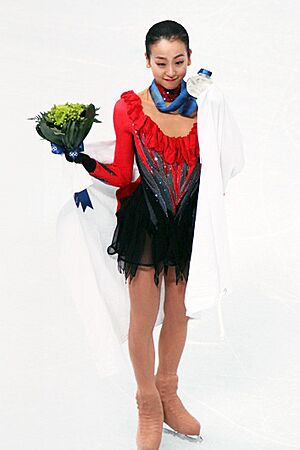
| Season | Short program | Free skating | Exhibition |
|---|---|---|---|
| 2016–17 |
|
|
|
| 2015–16 |
|
|
|
| 2014–15 | Did not compete this season |
|
|
| 2013–14 |
|
|
|
| 2012–13 |
|
|
|
| 2011–12 |
|
|
|
| 2010–11 |
|
||
| 2009–10 |
|
|
|
| 2008–09 |
|
|
|
| 2007–08 |
|
|
|
| 2006–07 |
|
|
|
| 2005–06 |
|
|
|
| 2004–05 |
|
|
|
| 2003–04 |
|
|
|
| 2002–03 |
|
|
|
Competitive Highlights
- GP: Grand Prix; CS: Challenger Series; JGP: Junior Grand Prix
| International | ||||||||||||||||
|---|---|---|---|---|---|---|---|---|---|---|---|---|---|---|---|---|
| Event | 01–02 | 02–03 | 03–04 | 04–05 | 05–06 | 06–07 | 07–08 | 08–09 | 09–10 | 10–11 | 11–12 | 12–13 | 13–14 | 14–15 | 15–16 | 16–17 |
| Olympics | 2nd | 6th | ||||||||||||||
| Worlds | 2nd | 1st | 4th | 1st | 6th | 6th | 3rd | 1st | 7th | |||||||
| Four Continents | 1st | 3rd | 1st | 2nd | 2nd | 1st | ||||||||||
| GP Final | 1st | 2nd | 2nd | 1st | WD | 1st | 1st | 6th | ||||||||
| GP France | 1st | 1st | 2nd | 2nd | 5th | 9th | ||||||||||
| GP Cup of China | 2nd | 1st | 1st | |||||||||||||
| GP NHK Trophy | 1st | 1st | 8th | 2nd | 1st | 1st | 3rd | |||||||||
| GP Rostelecom Cup | 5th | 1st | ||||||||||||||
| GP Skate Canada | 1st | |||||||||||||||
| GP Skate America | 3rd | 1st | 6th | |||||||||||||
| CS Finlandia | 2nd | |||||||||||||||
| International: Junior | ||||||||||||||||
| Junior Worlds | 1st | 2nd | ||||||||||||||
| JGP Final | 1st | |||||||||||||||
| JGP Ukraine | 1st | |||||||||||||||
| JGP U.S. | 1st | |||||||||||||||
| National | ||||||||||||||||
| Japan Champs. | 7th | 8th | 2nd | 2nd | 1st | 1st | 1st | 1st | 2nd | 1st | 1st | 3rd | 3rd | 12th | ||
| Japan Junior Champs. | 6th | 4th | 4th | 1st | ||||||||||||
| Team events | ||||||||||||||||
| Olympics | 5th T 3rd P |
|||||||||||||||
| World Team Trophy |
3rd T 1st P |
3rd T 5th P |
||||||||||||||
| Japan Open | 1st T 1st P |
1st T 4th P |
1st T 1st P |
3rd T 3rd P |
1st T 5th P |
1st T 2nd P |
1st T 1st P |
1st T 1st P |
||||||||
| WD = Withdrew T = Team result; P = Personal result. Medals awarded for team result only. |
||||||||||||||||
Images for kids
See also
 In Spanish: Mao Asada para niños
In Spanish: Mao Asada para niños
 | Delilah Pierce |
 | Gordon Parks |
 | Augusta Savage |
 | Charles Ethan Porter |


